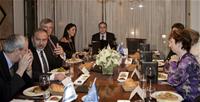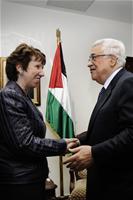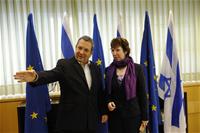Israel to the EU: You want a removal of the Gaza blockade? Take a responsibility then
Angel Shoilev Junior, January 10, 2011
 Israel called on the European Union to help with military forces for the removal of the Gaza blockade. Foreign Minister Avigdor Lieberman's statement came after his meeting with EU's High Representative for foreign affairs, Catherine Ashton and states precisely: "If you want to bring about an end to the siege of the Gaza Strip, you have to take responsibility and set up a strong, genuine and effective force to stop weapons smuggling ... I can assure you that the moment the weapons smuggling to Gaza stops, the siege will be lifted".
Israel called on the European Union to help with military forces for the removal of the Gaza blockade. Foreign Minister Avigdor Lieberman's statement came after his meeting with EU's High Representative for foreign affairs, Catherine Ashton and states precisely: "If you want to bring about an end to the siege of the Gaza Strip, you have to take responsibility and set up a strong, genuine and effective force to stop weapons smuggling ... I can assure you that the moment the weapons smuggling to Gaza stops, the siege will be lifted".
In a statement Ashton herself said, however, after her two-day visit in Israel and the Palestinian territories, says that European support includes infrastructure improvements around and at the borders, equipment and training of Palestinian border authorities, as well as the employees of the border crossings.
The European Union has border policemen for Gaza, stationed and on stand by in Israel but it is not very likely that they could be mobilised, as Mr Lieberman calls, the European Voice commented.
The EU insists on free cross border movement of people, goods and  humanitarian aid. According to the Union, this would be useful for both sides in the conflict, because it would make useless the so called tunnel economy. And it is more dangerous for Israel because, aside from first need goods, via the underground channels a lot of weapons are being transported.
humanitarian aid. According to the Union, this would be useful for both sides in the conflict, because it would make useless the so called tunnel economy. And it is more dangerous for Israel because, aside from first need goods, via the underground channels a lot of weapons are being transported.
The EU wants to increase its political role in the Middle East because, although it is the biggest donor in the region, it has a little political influence there. Leadership in the Middle East peace process has always been a "trade mark" for the United States. After the entry into force of the Lisbon Treaty and the creation of common foreign and security policy, the EU is trying to come up with a new and single face (baroness Ashton) on international stage and to speak with one voice to the world, according to High Representative's favourite metaphor.
 Except with Avigdor Lieberman, Catherine Ashton also met with the Minister of Defence, Ehud Barak, and the leader of the main opposition party Kadima, Tzipi Livni (former foreign minister of Israel). Ms Ashton spoke with PM Benjamin Netanyahu on the phone.
Except with Avigdor Lieberman, Catherine Ashton also met with the Minister of Defence, Ehud Barak, and the leader of the main opposition party Kadima, Tzipi Livni (former foreign minister of Israel). Ms Ashton spoke with PM Benjamin Netanyahu on the phone.
In Palestinian Territories' temporary capital Ramallah, the European first diplomat met with President Mahmoud Abbas and PM Salam Fayyad. Catherine Ashton said that the EU would allocate an initial package of financial aid of 100 mn euro from Budget 2011 for the occupied territories, which will be used mainly for wages of public servants, health care and education.